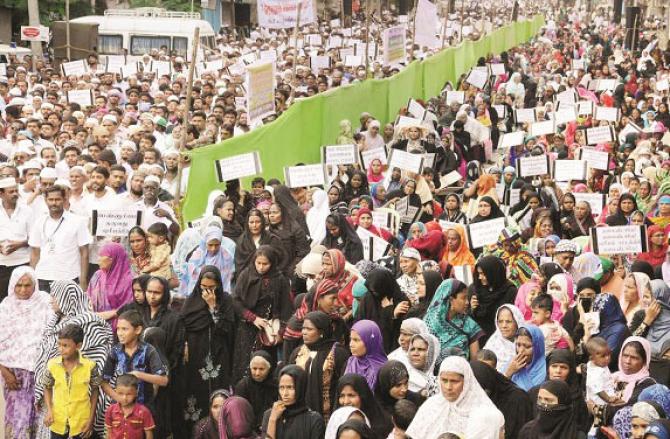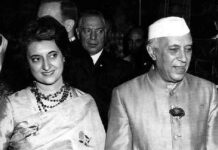On August 23, a group from the Board appeared at the Law Commission’s office. Included in the visit were the Board’s president, general secretary, and spokesman, as well as Shia, Barelvi, Jamaat-e-Islami, and Bohra leaders, two eminent Supreme Court lawyers, and two women. The board’s delegation was formed because the commission had given permission for up to 11 people to attend. On the other side, the chairman was joined by a five-person delegation from the commission, most of whom were retired judges.
India’s residents were surveyed in 2018 regarding their opinions of the Uniform Civil Code by the Law Commission. On this instance, the Muslims had resisted it vehemently. In response to the board’s invitation, a signing drive was also organised, and millions of Muslims who clarified their religious affiliation voted against the UCC and declared their complete satisfaction with Sharia law. The fact that it included the signatures of four crore Muslim women is significant because the government has discussed amending the Muslim Personal Law on the pretext of Muslim women’s false sympathy; however, at the time the commission refused to accept this important historical document. However, the Commission rejected the idea to propose and implement the UCC right away. The Board scanned it, and the document is still in the Board’s possession today. Summary of the meeting and discussion of the Muslim Personal Law Board delegation with the Law Commission
However, the current administration is likewise limited. It hasn’t been able to produce any work in the last nine years that can be shown to the public and voted on by them. The country’s currency continued to depreciate, and neither the occupied borders nor its value were improved. Since 1947, there haven’t been many instances of law and order violations because of how awful things have gotten. However, nothing has changed. What should the government do because they had created various agendas based on hatred for the vote, in which the topics of the Babri Masjid and Article 370 of Kashmir had been resolved? He needed a subject on which to plead for support, so he chose UCC as his prize. As a result, the Law Commission was called into action once more in 2023 to support the government’s position. People were asked what they thought. Thus, Muslims widely offered their thoughts under the urging of the Muslim Personal Law Board and several other religious organisations. Then, at the Board’s request, the Law Commission invited the Board delegation for clarification. On August 23, the delegation of the board appeared in the law commission’s office. It was made up of the president, general secretary, and spokesperson, as well as Shia, Barelvi, Jamaat-e-Islami, and Bohra representatives, as well as two renowned Supreme Court attorneys and two women. The board delegation was created as a result of the admission of guests.
On the other side, the chairman was joined by a five-person commission delegation, which was made up primarily of retired judges. Thank God that the board delegation not only refused to be intimidated but also asked these concerns on a number of occasions, to which he had no answers. When he thanked the Commission for holding this open meeting, the Commission responded that it is very odd to us that the Commission did not present any draughts of the UCC; however, by inviting people to share their opinions on it, it gave the impression that the Commission, under pressure from the government, hastily sought feedback on the issue without following due process. They were at a loss for words, but he kept saying that you gentlemen shouldn’t approach this issue from the perspective of any certain religion.
“Mutah” was the opening word of his speech. In this regard, our Shia representative noted, and a delegation member who is a Supreme Court lawyer added that the government and the court have permitted two adult men and women to cohabit without getting married. What right do you have to object to Mutah if we have been permitted to coexist? The only response from the commission representatives was silence. Then he questioned, “What do you say about Nikah Halala?” They were informed that there is no such thing as a halala marriage, neither in the Shari’ah nor in the Qur’an or in the hadith, nor is there any reference to halala marriage in our legal treatises. But if there is a marriage in Islam known as a Nikah Halala, then tell me about it; they were unable to respond to that question either, according to the legal texts.
What do you say about the marriage age, he was then asked? Is it possible for boys and girls to be married before they are 18? They were informed that actually becoming an adult is a separate thing, has to do with specific physical changes, and that 18 is a different thing, despite your assumption that at that age without any justification or rationale. When children grow up, how many instances of girls getting pregnant before this age or boys starting pregnancies will there be? Islam holds that marriage is not dependent on age but rather on the permission of the Aqdeen (those who marry) or their guardians. Boys and girls can marry at any age, however it is preferable if they wait until they are old enough to meet the conditions of marriage. It also has something to do with preserving moral standards in society and individual freedom. Every procedure in which the government is involved compromises an individual’s right to personal freedom. According to other delegation members who also analysed the statistics, there is no need for legislation because as girls discover economic prospects and the tendency towards education among boys and girls rises, the prevalence of child marriage will naturally decline. will get smaller.
Summary of the meeting and discussion of the Muslim Personal Law Board delegation with the Law Commission
In this two-hour discussion, a variety of topics were covered. They were informed that the Hindu Marriage Act requires that when women file for divorce, their issue be resolved and that divorce should be genuinely considered. Years are needed. A high court recently granted a wife’s request for a divorce at the age of 32. Newspapers have also reported on this information. Living alone for such a long time is extremely painful for both men and women. As a result, in addition to Islam’s prohibition of unnecessary divorce, a simple method of getting a divorce has also been made available when necessary. No matter how beautiful a house is, if there is a way in, there must also be a way out. Otherwise, it may be a beautiful prison but not a comfortable home. Islam therefore established three means of divorce: the husband may also grant a divorce; the marriage may be dissolved by a court; or the woman may unilaterally dissolve the marriage provided she made that request at the time of marriage. The woman will also be permitted to dissolve the marriage if the “Tafwaiz Talaq” right—which is obtained—is exercised. The commission was informed that marriage and the idea of divorce are intertwined. In Islam, marriage is viewed as a contract between the husband and wife, and all contracts have the option of being terminated. No other law in the world has ever allowed a woman to leave the marriage after getting married, as though she becomes the husband’s property.
The Commission also brought up the subject of adoption, and it was stated that since it is a voluntary procedure and nobody is compelled to adopt, there should be no objections to it because supporting orphans and vulnerable children is supported in Islam. The Board’s delegation emphasised that, according to Islam, marriage is a relationship that is created through spoken acts, whereas the bond between children and parents is a natural one that is created through marriage. This is utterly against nature, so the Shari’ah does not accept it. It is not like a man should say to someone, “You are my son,” and he should reply, “You are my father,” and only by this verbal exchange will their relationship of father and son be formed. But in Islam, supporting the poor and those in need is regarded as a very high-ranking act, to the extent that each gentleman is obligated to give away 2.5 percent of his money. This and adoption are very different from one another, and it is not entirely true that adoption is elective.
An someone chooses to adopt; yet, this impacts his other children and relatives’ rights even while their authority is unaffected.
The Law Commission members frequently brought up the subject of a daughter’s inheritance rights, and as they discussed the equality of the rights of son and daughter, the delegation made it clear to them that Islam is essentially He is convinced of justice, and he has taken care of it step by step by defining the rights and responsibilities. When justice demands that the rights and obligations of two members of society and the family be differentiated, equality is an unfair practise. However, sometimes equality is also a necessity of justice. In these cases, equality will be necessary. The sisters in the delegation emphasised with all their might that, according to Shariat, the son is solely responsible for supporting the wife, the parents, and, in some situations, the younger siblings, unmarried sisters, and other family elders. Sons are liable for maintenance, but daughters are exempt because they are the sole owners of their fortune and their husbands are not allowed to deal with it. As a result, the delegation argued for its standpoint persuasively and strongly.
The government is prepared to offer exemptions to the tribals and different religious units from the UCC, according to a senior Supreme Court counsel who is a member of our delegation. This was mentioned with explanations in the Hindu Marriage Act. It is obvious that the government is targeting Muslims in particular; is this a prerequisite of democracy and a violation of the rights guaranteed by the constitution? If the custom is against it, then this law will not be enforced on them. Despite the fact that he resisted the query, they made no comment.
Recently, this Natchez requested that you gentlemen understand the position of the Muslims in this matter. He noted that the Hindu Marriage Act is not based on the Vedas and was not derived from the holy books; rather, some people made it with their own thinking and understanding, and it is obvious that those who made it have the right to change it. In contrast, Sharia law is different from it, and a part of Muslim personal law is the Qur’an. is based on, which is not part of our tradition; Instead, it stems from our faith and beliefs; as a result, even if Muslims from all over the world wanted to modify it, they couldn’t. Anywhere can undergo change, but the Qur’an and Hadith, which the Board has included in its thorough response to the UCC, explicitly support the concerns you are raising. The Commission Chairman enquired as to whether other categories of laws might occasionally alter. I argued that the law of annulment of marriage from 1939 serves as an illustration of this, as most of its judgements are based on ijtihad and Indian academics have suggested modifications to the law in various situations.
The commission’s chairman also mentioned that various laws in Pakistan and Egypt had changed on this occasion. This unimportant person made the following argument: First of all, the impression conveyed is incorrect; the majority of laws in these nations fall under the purview of Sharia law, and in some cases, one jurisprudential school of jurisprudence has been adopted in place of another.
Others: My This is quite sad because we reside in a democracy where personal freedom is guaranteed, and you offer the dictators of Pakistan and Egypt as examples. Can we take inspiration from their behaviour? Is? Additionally, they were told that the viewpoint of the group for whom the law should be made should be taken into consideration rather than having a law imposed on them. In light of the fact that the government has created various laws for each class to ensure that the law is not imposed on people against their will, why is the discriminatory attitude against Muslims adopted, and why are different standards maintained for the two nations?
However, after a lengthy discussion, the meeting was over. Allah knows what the government’s intentions are, but the Board’s delegation argued persuasively for its position. It was made obvious that Muslims are completely in accord on these matters and that there are no differences between them while introducing the representatives of the various Masalik who are part of this group.
The Muslims should decide that they will follow Sharia in all situations, regardless of what action the government takes. No amount of greed or fear will be able to dislodge them from their position.



